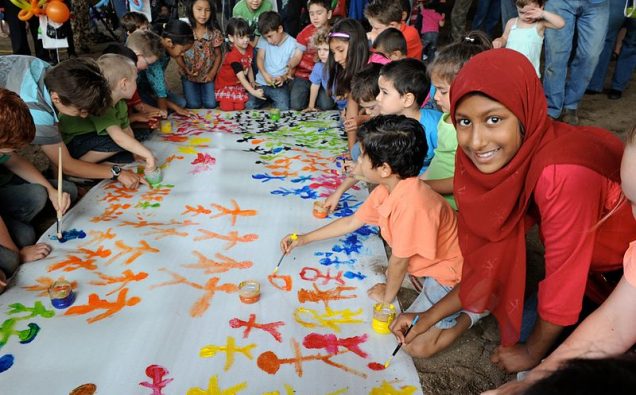
By DIAC images (Harmony Day celebration of diversity in Australia) via Wikimedia Commons
These are chaotic times with democratic norms and diversity becoming big victims in the face of political stereotyping, xenophobic policies, exclusionary otherness, nationalism, extremist violence, and ethnic and sectarian cleansing amid festering armed conflicts.
In fact, many critics question: What kind of diversity are we talking about, when so many communities are subjected to discrimination and violence around the world?
Hailed and proven time and time again as the spice of national life and foundation of innovation and progress, diversity is under serious attacks at several places.
East Europe’s inhuman treatment and rejection of refugees, the shrinking populations of minorities in Pakistan in the face of religious intolerance, mob killings of Muslims, Christians and Dalits in India, threats of violence against Muslims and Jews in America, ISIS’s attacks against Shia communities, Iran’s intolerance of the Sunnis, Saudi Arabia’s repression of the Shiites, bloodshed of Rohingyas in Myanmar, and violence against communities in Sudan happening simultaneously is a scary scenario.
Clearly, it is not just autocratic and conservative regimes that are to blame. Politicians in democratic elections are reaping a windfall of votes from exploitation of excessive nationalism and populism. Established democracies including India and the United States have seen incidents of discrimination against minorities.
Then there is the state terrorism – India’s blinding of civilian Kashmiri protesters through pellet guns, which The New York Times wondered could be the largest such campaign in modern history. Iran and Saudi Arabia have for long been controlled by sectarian-driven regimes. Their proxies have made life hell for people in Iraq and Syria.
In Myanmar, Aung San Suu Kyi, once hailed as rights champion and awarded a Nobel Prize, has not only refused to condemn UN-documented ethnic cleansing of Rohingyas but also denied any state repression.
Another set of countries like Afghanistan are victims of great games between and among surrounding and international players. Then there is the example of Israeli occupation of Palestinian lands and frequent military operations in civilian areas.
According UN officials, the current levels of refugee movement is unprecedented and according to experts since WWII, the world has not seen such large-scale escalation of targeted violence.
The Arab world – which saw a huge hope in the Arab Spring of revolutionary movements for democracy – has seen bloodbath and stifling of dissent as some strongmen have disappeared leaving anarchy while others have muted demands for democracy with killing sprees as in Egypt.
In the words of W.B. Yeats “mere anarchy is loosed upon the world and everywhere, the ceremony of innocence is drowned.”
What are the reasons for such chaos and intolerance?
The reasons vary as widely as geostrategic and internal environments of the country – lack of governance, hunger, poverty, absence of hope and economic opportunity, unending avarice of the ruling elites, the rise of populism, denial of democratic rights and so on.
But at the international level, the world has become increasingly complex with regional rogue states having a field day.
The militant groups’ destruction of religious sites, cultural heritage and Sufi shrines are a terrible chapter.
Some international experts say eroding U.S. leadership under Barack Obama’s second term, particularly his handling of the Afghan war and retreat from the Middle East, is also to blame for some of the troubles. But at home, a majority of experts agree, the Obama Administration was careful enough not to alienate American Muslims.
Now the question facing the Trump Administration is what should be the U.S. policy toward the Middle East that works in the interest of both the United States and the Muslim countries.
For the world challenged on too many fronts – from climate disasters to chaos of conflicts- the way forward cannot be a halfhearted approach to crisis management. It should be nothing short of a total embrace of diversity, equality and tolerance – which might sound a long-term ambitious project. But the globalization at the technological and trade levels has given its verdict with clear signs that coexistence, inclusiveness and pluralism will be key components of a way out for the inextricably interlinked world.
While the rise of populism and right wing politicians espousing rhetoric against minorities and display of excessive nationalism – the modern form of tribalism – has severely damaged the civilization, there have been some examples that send out a message of hope
New York has had Bill di Blasio as its mayor, London elected the first Muslim mayor Sadiq Khan, and more recently the Dutch and French elections have stemmed Europe’s tide of populist pitch that promotes xenophobia.
President Donald Trump, who is visiting Saudi Arabia on his first foreign trip, has much to do in terms of canceling out the harm the 2016 election rhetoric against Muslims and immigrants, and the now-frozen ban on entry of people from six Muslim majority countries did to the American society, which still largely believes in the value of diversity for America’s progress.
Last year, six of the seven American Nobel Laureates were immigrants and the stories of immigrant physicians, businesses, and IT leaders that give American a massive edge over other countries are known to everyone. Around 10 percent of all American physicians are Muslims. According to former general and CIA chief David Petraeus, Muslims are the United States’ most important ally in the fight against extremism.
Trump’s summit with the Arab and Muslim leaders in Saudi Arabia takes place on the World Day for Cultural Diversity for Dialogue and Development. Back home, on his return, the U.S. president must reach out to American Muslims and give a message of their being valuable contributors to America’s development.

















